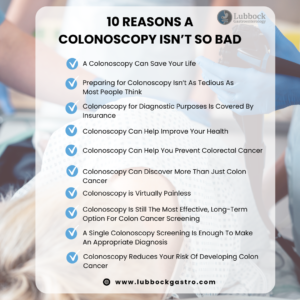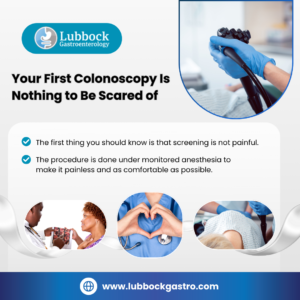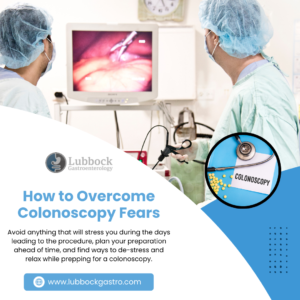10 Reasons a Colonoscopy Isn’t so Bad
Colonoscopy is a procedure used to check inside the colon for colon cancer. Noncancerous polyps in the colon can become cancerous if they are not removed on time. Noncancerous polyps are removed during colonoscopy if they are found in the colon before they become cancerous.
There are many reasons why you should undergo colonoscopy. Medical professionals recommend undergoing screening at least once every 10 years for people who are age 50 and above, and once every 5 years for people who are age 60 and above.
Below are 10 reasons why colonoscopy isn’t bad and why you should get your colon checked.

10 Reasons a Colonoscopy Isn’t so Bad
A Colonoscopy Can Save Your Life
Colonoscopy is used for both diagnostic and therapeutic purposes and it can help with detecting malignant tumors in the colon before they turn cancerous. A routine colonoscopy helps with early detection which is imperative when it comes to cancer like that of the colon.
Similar to cancers of other organs, the cancer of the colon also has stages and sub-stages ranging from 0 to IV and with increasing stages, they are associated with higher morbidity and mortality rates.
Stage I colon cancer has an approximate 91% five-year survival rate, while stage IV colon cancer, the most severe stage, has a 14% five-year survival rate. A colonoscopy helps to detect the tumor at a stage with minimal complications to minimize the risk of severe complications and to save your life.
Preparing for Colonoscopy Isn’t As Tedious As Most People Think
Preparing for a colonoscopy screening is not as tedious as most people think. You only need to tweak your diet a bit during the days leading to the procedure, go on a liquid-only diet, and take laxatives to clear your gastrointestinal tract.
The powder you want to use for clearing your colon may not be tasty but you can easily mix it with a beverage of your choice such as Gatorade or juice. You need to ensure your beverage of choice isn’t red or pink.
You can also split your prep in half such that you only drink half of the solution the day before your colonoscopy and half the day before the procedure which is more convenient for most people.
Colonoscopy for Diagnostic Purposes Is Covered By Insurance
The American Cancer Society announced in 2018 that men and women who are age 45 and over should book their first colonoscopy. Some other official organizations still stick to the 50 years and above as the threshold.
A colonoscopy screening generally costs less than most diagnostic procedures. Most insurance providers cover the cost of colonoscopy if you are at high risk of developing colon cancer such as if you have a family or personal history of colon cancer, rectal cancer, colorectal cancer, or polyps, irrespective of your age.
You can reach out to your insurance company to confirm if your insurance plan will cover your procedure.
Colonoscopy Can Help Improve Your Health
Colonoscopy itself can help improve your health, as well as the preparation for the procedure. During your prep for the procedure, you get to clean up your colon, eliminate toxins, and build up in the gastrointestinal tract.
With colonoscopy screening, you become more confident about the status of your gastrointestinal system. If there are any polyps or gastrointestinal issues present during the screening, you get to discover them early and appropriate treatment will be provided.
This helps to improve your health and quality of life. Also, if you have been experiencing constipation, a colonoscopy will leave you feeling more refreshed.
Colonoscopy Can Help You Prevent Colorectal Cancer
Colorectal cancer is the fourth most common cause of cancer death in the U.S. Removing the adenomas (polyps) found in the colon during the procedure can increase the survival rate by more than 50%.
Colorectal cancer can begin as asymptomatic non-cancerous polyps at early stages and with routine colonoscopy screening; it can be detected and removed before it becomes cancerous.
Previous research has shown that colonoscopy is associated with as much as a 69% decrease in new cases of colorectal cancer and an 88% decrease in the risk of death from colorectal cancer.
Colonoscopy Can Discover More Than Just Colon Cancer
Apart from colon cancer, colonoscopy can also detect inflammatory bowel diseases (IBD) such as Crohn’s and ulcerative colitis. Both of these conditions cause inflamed intestines and detecting them early helps reduce the long-term damage they can cause such as scarring and bleeding in the colon, pain, and intestinal blockages.
Inflammatory diseases also might increase the risk of colorectal cancer. Diverticulosis is another condition that can also be discovered. With early detection and simple dietary changes, such as eating more fiber, you can relieve the painful symptoms of diverticulosis.
Colonoscopy is Virtually Painless
Seeing that colonoscopy requires the insertion of a flexible tube into the colon, most people seem to think the procedure will be painful and uncomfortable. However, that’s not the case as anesthesia is used during the procedure.
You will also be given medicine through an intravenous route that will keep you comfortable and not feel pain. The most uncomfortable thing you will feel is soreness at your IV site, but that isn’t usually painful.
You might also keep passing gas with some startling force until a few hours after the procedure.
Colonoscopy Is Still The Most Effective, Long-Term Option For Colon Cancer Screening
There are a lot of methods for screening for colonoscopy cancer, but none of these alternatives come with as many advantages. Home colon cancer screening stool tests are highly sensitive for cancer that’s already present and don’t detect non-cancerous lesions that have the potential of becoming cancerous.
If you opt for a FIT test or fecal DNA test which is expensive and requires repeated tests to detect cancer, you will still need a colonoscopy. Additionally, it usually needs to be done once every 10 years if the results are normal.
Some other methods, like flexible sigmoidoscopy and double-contrast barium enema, must be done every five years. With most of these other alternatives, if a polyp or suspicious mass is found, a colonoscopy will still be required.
Hence, colonoscopy is the best option for colon cancer screening.
A Single Colonoscopy Screening Is Enough To Make An Appropriate Diagnosis
Just one screening is enough to make a diagnosis and if results are normal, you won’t need to schedule another session until after 10 years. If the doctor doesn’t notice any polyps, you are good to go.
In cases where low-risk adenomas are detected and removed, you only need to go back for another colonoscopy screening after five years. You may need to undergo screening more frequently if you have a family history of colon cancer.
Colonoscopy Reduces Your Risk Of Developing Colon Cancer
According to the American Cancer Society, there are about 106,590 new cases of colon cancer (54,210 in men and 52,380 in women) in 2024, and it’s expected to cause about 53,010 deaths in 2024.
The rate of people being diagnosed with colon cancer each year has dropped overall since the mid-1980s mainly because more people are getting screened and changing their lifestyle-related risk factors.
With a colonoscopy, you will be able to know your status on time. If any non-cancerous polyps are found, they will be removed before they turn cancerous, thereby reducing your risk of developing colon cancer.
Your First Colonoscopy Is Nothing to Be Scared of

Your First Colonoscopy Is Nothing to Be Scared of
The first thing you should know is that screening is not painful. There is a lot of misconception that it hurts, but that’s not true. There’s nothing to be scared of when it comes to colonoscopy.
The procedure is done under monitored anesthesia to make it painless and as comfortable as possible. It’s a life-saving screening that can help detect any sign of colon cancer or precancerous polyps, prevent colon cancer, and boost the health of your gastrointestinal system.
According to the American Cancer Society, an individual should do a colon screening after turning 45 years.
How will you feel after a colonoscopy?
You’re most likely going to feel bloated and have stomach cramps for 2 to 3 hours after a colonoscopy. You may also notice some blood in your stools or bleeding from your anus for a couple of days after the procedure.
Why You Shouldn’t Be Afraid To Get a Colonoscopy
Colonoscopy is generally safe; it’s nothing to be afraid of. It’s associated with side effects that resolve within a few days and only about 1% of patients have experienced severe complications from colonoscopy.
How to Overcome Colonoscopy Fears

How to Overcome Colonoscopy Fears
Avoid anything that will stress you during the days leading to the procedure, plan your preparation ahead of time, and find ways to de-stress and relax while prepping for a colonoscopy.
Talking to your provider can also help manage your anxiety about the procedure.
Take Care of Your Colon at Lubbock Gastroenterology in Lubbock, TX
A colonoscopy is more than a screening tool. It helps prevent cancer and cancer-related death. It can also be used to discover more gastrointestinal conditions other than cancer.
This life-saving procedure should be performed by a board-certified gastroenterologist such as the one at Lubbock Gastroenterology in Lubbock, TX.
Dr. Sameer Islam is a trained and experienced Gastroenterologist who conducts comprehensive colonoscopy screenings and other diagnostic procedures.
If you have a family history of colon cancer or are experiencing symptoms that may be due to colon cancer, contact Dr. Islam or book an appointment at Lubbock Gastroenterology for colonoscopy screening in Lubbock, TX.
